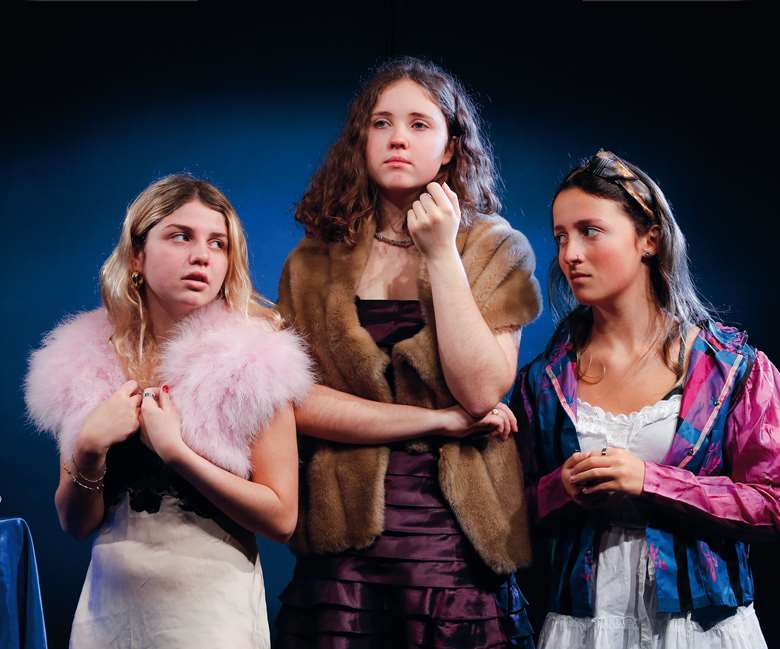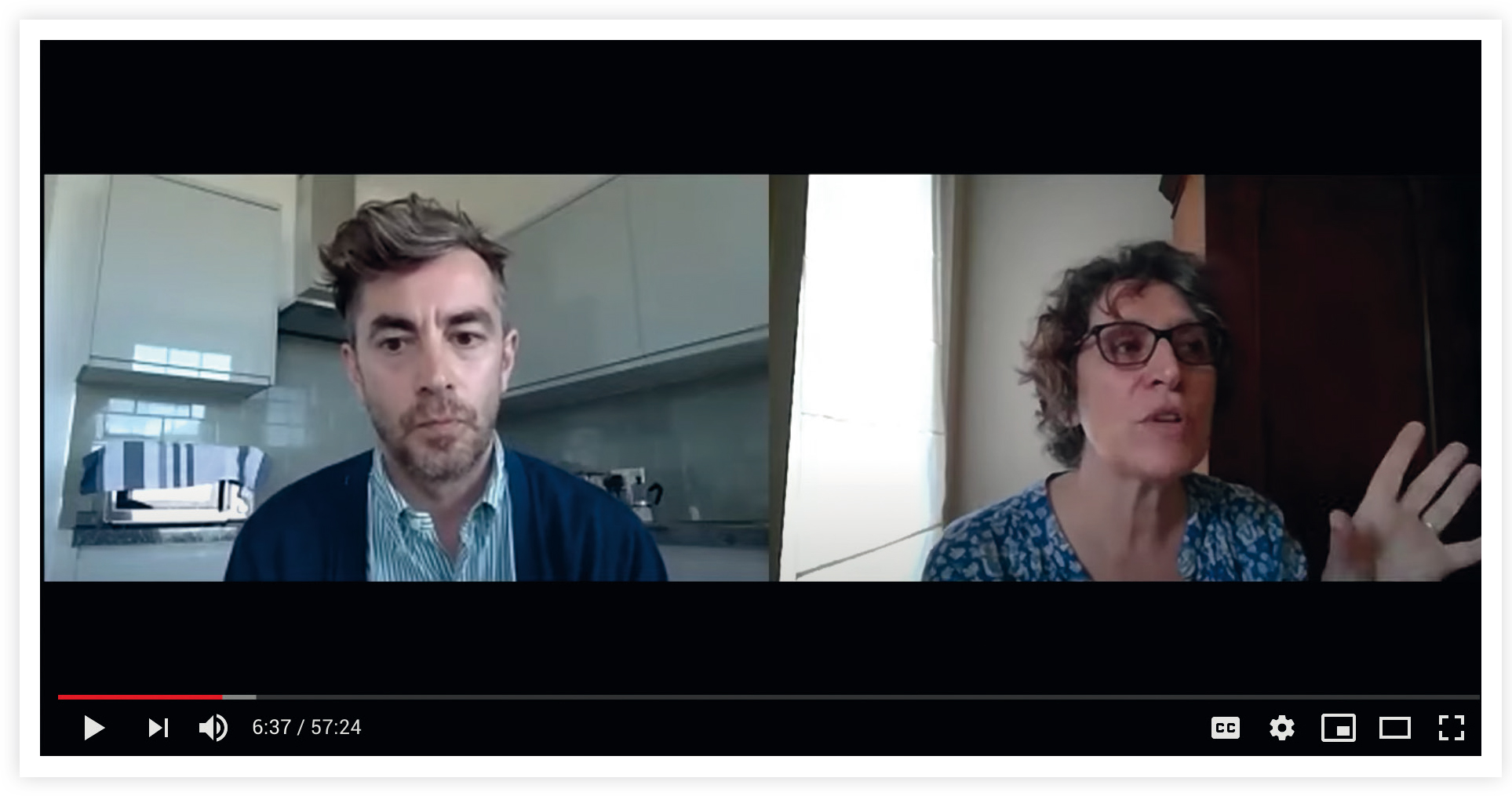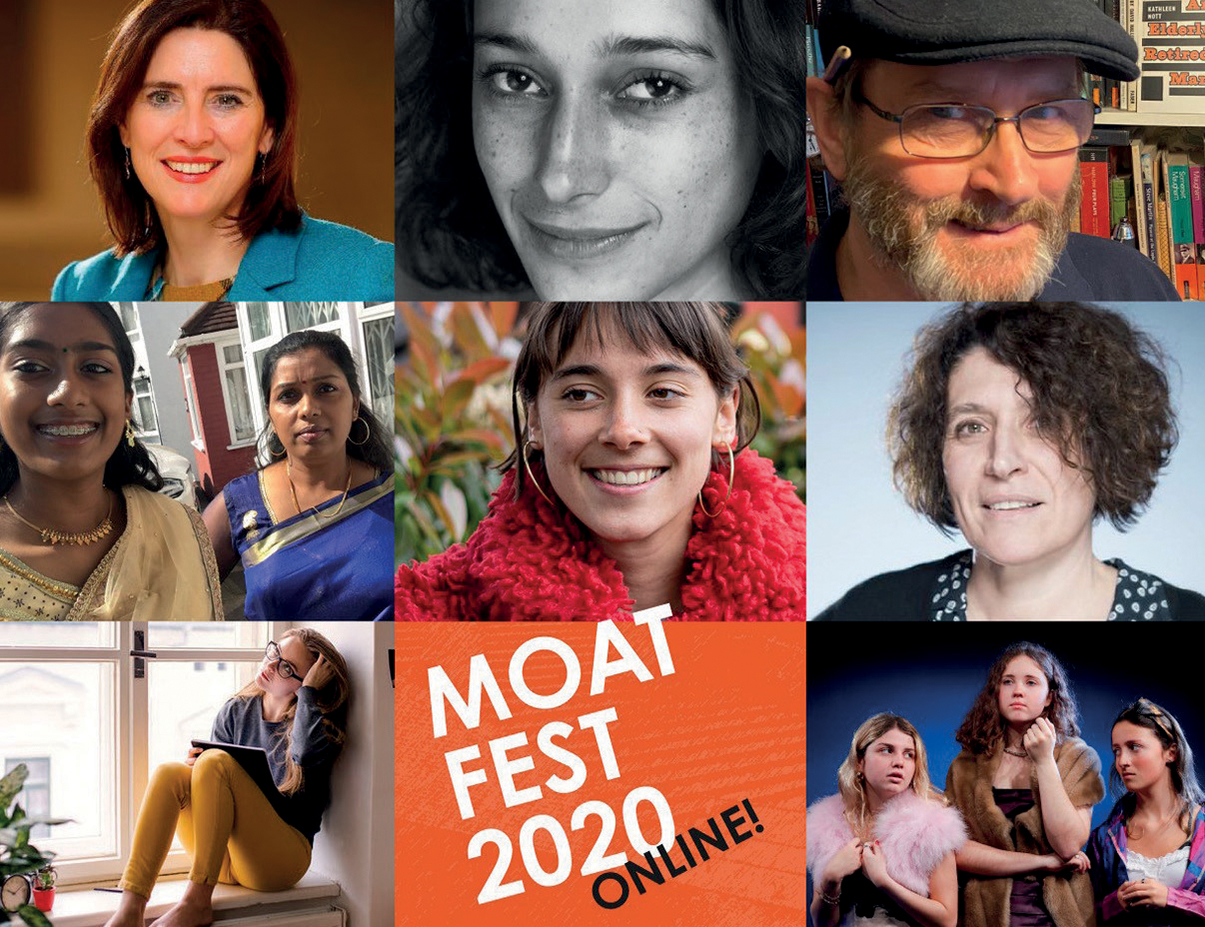MOATFEST: Triumphantly afloat
Chris Whyld
Thursday, October 22, 2020
Acting Director of Drama at City of London School for Girls, Chris Whyld, was undeterred by lockdown and managed to mount an online theatre festival at his school. He tells D&T how he did it

Each summer term at City of London School for Girls we host an outdoor theatre festival called MOATFEST, an acronym for the Mountjoy Open Air Theatre Festival. Mountjoy being Christopher Mountjoy, the early 1600s wig maker who lived with his family on Monkwell Street, and who between 1598 and 1612 hosted a successful playwright lodger – William Shakespeare.
Monkwell Street and the surrounding area was destroyed during the bombings of the Second World War, and the Barbican now stands in its place. The brutalist concrete complex comprises 2,000 flats, the Barbican Centre, Guildhall School of Music and Drama, our school and some unique urban outdoor space, part of which we have commandeered to use as an open-air theatre.

Chris in action, doing a Q&A with playwright April de Angelis
The challenge
This year, I was presented with the challenge of transferring MOATFEST from our concrete amphitheatre to the more abstract space of the online. It was to be broadcast in June, deep into lockdown, by which stage many were understandably fatigued with Zoom meetings, reunions, repurposed, rehashed play readings, internet glitches, computer crashes, ‘we can't hear you, you're on mute’ and staring out of the window of our home offices thinking, ‘If someone says “unprecedented” one more time…’ ‘It's not as good as the real thing, the whole point of theatre is its “liveness”. The visceral excitement of physical bodies, audience and performers, inhabiting the same space is totally absent’, were the murmurings among some of my theatre friends.
I decided that coming up with a diverse programme in terms of content and people involved, to be delivered over a relatively short amount of time (three days) to keep it focused and energised, with a selection of events which would ‘work’ online via Zoom, could be the way forward. Adding to this the overarching theme of ‘Celebrating Women in the Arts’, I thought might just stave off cynical murmurings, inspire our creativity and bring us together under what have been difficult, and indeed ‘unprecedented’ circumstances.
Planning this event, without ever actually meeting anyone involved in ‘real-life’ was the first challenge. It was a mixed experience of being in the more relaxed slippered and pantalooned environment of one's own home, and the disconcerting feeling of having no idea if this new form of theatre festival would take off or sink into the deep and terrible abyss of crimes against theatre.
A programme which included participation from year 3 to year 13, alumnae, professional practitioners, parents, teachers, friends and family was put together, and on Wednesday 17 June 2020, we went ‘live’. Three or four events were scheduled per day, and we set up a ticketing system (free tickets) so that we had an idea of audience numbers, but more importantly we could add a layer of security by sending those who registered for an event the Zoom link and then tick them off before allowing them to enter from the ‘waiting room’.
The line-up
Here's a selection of what, I hope, circumvented the abyss:
Desert Island Discs with Jenny Brown
For years I have harboured a secret dream of being a BBC Radio 4 presenter, and so here was an opportunity to sort of fulfil it! Jenny is our new Headmistress and what a first year to be at the helm. In her own words, ‘How would you manage a global pandemic?’, wasn't one of her questions at interview. The Desert Island Discs format gave Jenny a chance to share with us how this strangest of first years has been, and for students, parents and staff to find out a little bit about her and her family, her journey to CLSG and some of her musical and literary passions. I had the thought that under ‘normal’ circumstances, we might not have had this opportunity, we might not have been collectively transported off to another place by Puccini's ‘O mio babbino caro’, or have reflected on both the struggle and optimism present within Nina Simone's ‘Feeling Good’.
Zoo by Steve Morley
After 20 years in charge of the Drama department at CLSG this was to be Steve's last term before retirement, and so to perform a play written by him for radio seemed like a good way to acknowledge his leadership and achievements, not least the fact that he set-up MOATFEST in 2015. The two-hander radio play format suited Zoom, in that both actors, if in ‘gallery’ view, can have their scripts on screen and appear to be talking directly to the audience, and with a modicum of suspension of disbelief, you can believe that they're in the same room. With an added co-host as technical support, sound effects and music can be played, and the atmosphere of husband and wife zookeepers on the brink of personal disaster being an allegory for the fall of the Soviet Empire, created.
Monologue competition
Being at home for an extended period of time gave us ample chance for reflection. So why not get those musings down on paper in the form of a monologue? I set students, teachers and parents the task of writing a monologue on the theme of ‘isolation’. There were four categories: year 7–9, year 10–11, sixth form, parents and teachers. Three monologues from each category were chosen to be performed by professional actors, Holly Joyce and Monica Anne.
I thought it best to make the rules and criteria clear: The monologue should be 250–500 words, it should reference one of the senses, something new should be discovered, a specific place is referenced, a thought provoking question is posed, there is a clear character and a sense of conflict. The quality of submissions was exceptional, it was a case of imaginations let loose, creativity at its best, perhaps as a result of isolation? Highlights included this opening from Daisy in year 9:
‘The room was musty with an unpleasant smell of paraffin emanating from a lamp balanced precariously on a pile of antique books in one corner of the room. The lamp was an ornate affair, giving an impression of grandeur which, like most of the room, made the situation more pathetic.’
And Olive and her mum who each wrote a monologue on the same situation but from different perspectives; and Malika in year 13 who reflected on her lack of human contact which gave chance eye-contact in the supermarket whole new levels of meaning.
Q&A with April de Angelis followed by a performance of April's play Jumpy
I've used scenes from Jumpy with GCSE and A Level students on several occasions and believe the first scene between Hilary, her daughter Tilly and Tilly's friend Lyndsey to be a classic. Like my BBC Radio 4 dreams, I've also dreamed of directing the whole of Jumpy, and lockdown provided an opportunity!
The previously mentioned Holly Joyce helped to bring together a group of actors, who were willing to perform Jumpy via Zoom and be directed by yours truly. Again, it was to a degree, a suspension of disbelief situation, but with neat little tricks like one character passing wine to another character (the passing and receiving arms going on camera–off camera–on camera), actors looking directly at the camera, ensuring the audience were on ‘gallery’ view and actors turning on their cameras when entering a scene and turning them off (or leaving me, the host, to turn them off) when exiting a scene meant it went pretty smoothly.
There were one or two occasions when I had to come ‘on-air’ and ask everyone to wait patiently while an actor's internet connection re-stablised, but a patient and gracious audience helped to keep the whole event afloat. When applying for the rights I had the thought that April de Angelis might want to see the production and she perhaps might even agree to a Q&A. With an email to her agent and a message or two on Twitter, April gladly agreed and gave us wonderful insights into her career and the art of playwriting.

The Refugee by year 11 GCSE Drama student, Harshana
For me, one of the highlights of the week was Harshana's verbatim piece on how her parents escaped the civil war in Sri Lanka. Through transcribed interviews with her mum, Harshana and her fellow GCSE Drama friends, told the story of how her parents arrived safely in the UK after an extraordinary journey of courage, compassion and luck through Switzerland and France. A clear upside of at-home learning had been the space it gave Harshana to spend time with her mum and discover for the first time the details of her parents’, and therefore her own, story. This, a story which might not have been discovered and told within the established routine of pre-lockdown ‘normal’ life. The piece attracted the attention of other online festival organisers and The Refugee was performed again, in a somewhat bigger festival, to a global audience.
The Maids by Jean Genet performed by A Level Theatre Studies students
Our final event was an excerpt of Genet's absurdist masterpiece The Maids performed by our three year 12 students. The play is an exploration of power, the marginalised under-class, fantasy versus reality and the troubled psychology of Claire and Solange, sisters and maids employed by Madame. It was this latter theme of psychological torment which we felt might come across most strongly through the screen, and via a medium in which we weren't able to explore physical interaction. We aimed for an intense, direct-to-camera delivery of the scene, focusing on the mental anguish we can inflict upon others and ourselves.
The MOATFEST 2020 events can be watched via CLSG's YouTube channel: https://tinyurl.com/DTAu2MOAT
If you would like any further information or if you would like to get involved with MOATFEST 2021, please do get in touch.

